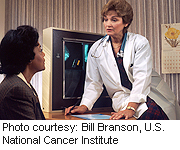
TUESDAY, April 10 (HealthDay News) — A leading U.S. government panel has renewed its 2004 recommendation that women at average risk for ovarian cancer not get screened for the disease.
The currently used blood test and transvaginal ultrasound may cause more harm than benefit for those patients, according to draft recommendations issued Tuesday by the U.S. Preventive Services Task Force.
“Currently, the task force does not recommend screening for ovarian cancer,” said Dr. David Grossman, a member of the task force and senior investigator with Group Health Research Institute in Seattle. “The tests that we have, unfortunately, just aren’t very accurate and, with a lot of false positives, a lot of women get harmed with unnecessary biopsies and surgeries.”
Women with a family history of ovarian cancer should be referred for genetic testing and counseling, the recommendations also state.
Two methods are currently used to test for ovarian cancer, a blood test which looks for the tumor marker CA-125 and a transvaginal ultrasound, Grossman explained.
However, a large study published last year found no difference in mortality between women who were randomly assigned to receive a blood test plus the ultrasound compared to those who had “usual care.”
What’s more, some 10 percent of women who underwent screening received a false-positive result and one-third of these had an ovary removed unnecessarily.
Another study estimated that 33 surgeries were needed to diagnose one case of ovarian cancer using the blood test/ultrasound screening.
Preliminary data from yet another trial, ongoing in the United Kingdom, also turned up false-positive results in about 10 percent of women undergoing screening. Half of those women had surgery and about 4 percent of these experienced a major complication from the surgery.
Like many screening tests, the blood test plus ultrasound for ovarian cancer “doesn’t work, is potentially dangerous and also costs a lot of money,” said Dr. Jay Brooks, chairman of hematology/oncology at Ochsner Health System in Baton Rouge, La.. “You’re giving people a false sense of security, and it creates a lot of false positives which ultimately results in a lot of unnecessary surgeries.”
Yet, many doctors still perform the tests because women demand it, Brooks noted.
With no new data affirming the benefit of CA-125 screening plus ultrasound, the new draft recommendations essentially reaffirm 2004 recommendations.
They are also in line with recommendations from the American Cancer Society and the American Congress of Obstetricians and Gynecologists (ACOG), Grossman said.
This leaves women with no good test to screen for ovarian cancer, considered a “silent killer” because symptoms are often noticed too late to be treatable.
“At the present, we do not have a good screening test for ovarian cancer,” Brooks said.
And there are no other techniques on the horizon, Grossman added.
The draft recommendations will be posted on the task force website, and physicians and members of the public and of professional societies are invited to comment.
Final recommendations may be out in as soon as two months, Grossman said.
More information
The U.S. National Cancer Institute has more on ovarian cancer.

